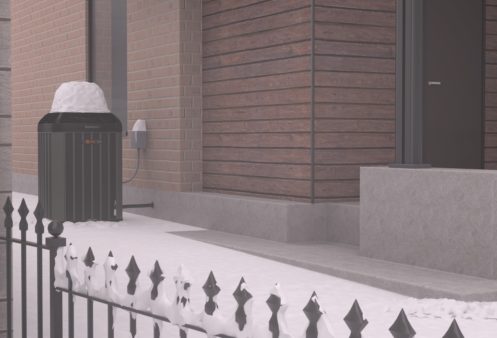As the weather starts to chill off outside, responsible homeowners are preparing their homes to undergo the harsh winter season. One maintenance task that is always a very hot debate in the heating and air conditioning world is covering your outdoor air conditioning unit. Some people believe it should be covered, while others think it shouldn’t.
What Is All of the Concern About?
The main reason that people think their air conditioning unit needs to be covered is to protect it from adverse winter weather conditions like snow and sleet. People fear this moisture can get down into their air conditioning unit and cause damage to its internal components. However, is this a necessary concern for homeowners?
Your AC Unit is Built to Last Through Harsh Winters
Contrary to what you may believe, outdoor air conditioning units are specifically designed to withstand winter’s harshest conditions. Whether it’s five feet of snow or below-freezing temperatures, your outdoor condenser unit is excellent in wintertime conditions. There is no need for it to have a cover to maintain its warranty or stay in good working condition.
What’s the Problem With AC Covers?
When most people think about an air conditioning system cover, they think about a full-size product. These covers slide down over the entire air conditioning unit and encase it. However, airflow is restricted from being able to penetrate the cover because the cover is typically constructed of a hard-like, non-porous material.
When air cannot flow freely throughout your air conditioning unit, moisture can be trapped inside. This moisture creates the perfect breeding ground for unwanted mold and mildew. Additionally, it can lead to corrosion of the metal components inside your air conditioning system and require premature replacement.
Apart from restricting airflow, which can lead to many other issues we discussed above, full-size AC covers serve as an attractant for outside animals. They will burrow their way into the unit to get out of the cold, windy winter weather. No one wants to deal with unwanted critters inside of their AC unit when they go to use it next summer season.
Consider Partial Covers
Its top section is the only part of your outdoor air conditioning unit that can allow debris to get inside. This is because the top has open holes that are meant to help its ventilation fan. Unfortunately, unwanted debris, like leaves, can be blown down into those holes and stuck to the metal fan blades. Over time, this can lead to the formation of corrosion as the leaves deteriorate on top of the metal.
A great way to help prevent unwanted debris like leaves from getting inside your air conditioning unit is to use what’s known as a partial cover. This specific cover is designed to sit over the top of an outdoor air conditioning unit. It’s constructed of a mesh-like material that allows the free flow of air in and out of your team.
Partial covers are straightforward to use as they have bungee straps that simply attach to the sides of your unit to hold them in place. For example, suppose you get a lot of debris from surrounding trees at your property. In that case, consider utilizing a partial AC unit cover during the fall and early winter months to protect against debris from getting into your system.
A Good Cleaning Goes a Long Way
As you’ve previously learned, whenever unwanted debris makes its way inside your air conditioning system, it can lead to many other problems. So one of the best ways to help prepare your HVAC system for its long wintertime nap is to give it a good thorough cleaning.
All you need is a basic garden hose, a scrub brush, and a condenser cleaner that you can find at your local hardware store. You want to clean your unit out in the late fall months to ensure that there’s no stuck-on debris in your unit when the winter season rolls around.
Professional HVAC Services
Polar Express Plumbing, Heating and Air Conditioning provides professional HVAC services for Lake Elsinore, CA, and surrounding communities. We can assist with all of your duct cleaning, air purification, and humidification needs. Call our office to schedule your next service appointment with our skilled HVAC technicians.



